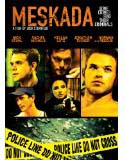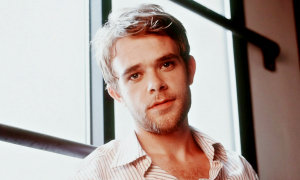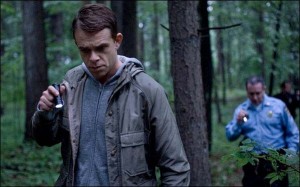Actor Nick Stahl has a long resume, from TV movies and acting opposite Mel Gibson in 1993’s The Man Without a Face, to playing the infamous John Connor in Terminator 3: Rise of the Machines, to being the innocent but powerful peacemaker in HBO’s acclaimed TV series Carnivale and playing the nasty and appropriately named Yellow Bastard in Sin City. In the independent thriller Meskada (DVD $26.98, Anchor Bay, released on March 22, 2011), he plays Noah Cordin, a police detective trying to solve the murder of child.
While the bustling South By Southwest festival raged outside his Austin home, Stahl chatted with Disc Dish about his films, his love of Texas and his favorite DVDs.
Disc Dish: Looking at your list of movies, you do a lot of indie movies like Meskada. Do you prefer those as opposed to movies like T3?
Nick Stahl: No, it’s just kind of how it’s worked out for me. I’ve always been really focused on story and character, and for the films that have come my way, that’s just how it has happened for me. I’m not particularly drawn to smaller or bigger movies. T3, for example, I thought it was such a rich story. It was a bigger film, but it had such great characters and such an interesting mythology to it. To me, it was no different than doing a smaller drama. I mean, the stuff I did in the movie was extremely dramatic. The only difference is, many more people are going to see it. But to me, it’s always been story and the role first, and I’ve been lucky to do a variety of types and sizes of film.
DD: That goes nicely into my next question. Meskada‘s a thriller, but on top of the murder that your character’s investigating, he has a lot going on with his family. So there’s a lot underneath the main story. It seems like you chose characters that have a lot of drama. How do you prepare for these kinds of roles, specifically Meskada‘s Noah Cordin?
NS: I try to get as much of an understanding as I can of the motivations of the character. I try to imagine the history for characters and get as much of a thorough understanding of the material and the breakdown of the story as I can. I really like to see the entire story as a context for what I do. I think that’s one of the bigger challenges, to have an understanding of not just, what’s my motivation in this scene, but how does this scene serve the film as a whole? How does this serve the story and serve the arc of the story? Where in the dramatic arc is this scene located? For me, that’s always been something I feel I have to offer, I guess, just more of an understanding of story. But it’s also one of the bigger challenges, I would say.
DD: You wanted to act since you were 4, and you were doing plays in the theater your mom worked at in Texas, where you’re originally from. Did you move to Los Angeles as some point to pursue your career, or did you always work out of Texas?
NS: I lived in L.A. for 13 years. I’ve been here [in Austin] for two now. But I moved to L.A. from Dallas, where I grew up, when I was 16.
DD: 16! That’s young. Did you go by yourself, or with family?
NS: My mom went with me for about a year, and then I found some roommates. I had done a bunch of movies as a kid from Dallas, but in order to secure work, I had to fly out to L.A. often, and as it was me who was paying for it, it just made more sense for me to move out there. And then, you know, I felt I had been there long enough, and I decided to come back home. I still go out there now — a lot.
DD: Austin does have quite a lot going on with film now.
NS: Yeah, it does. I’ve actually only worked here once, but I was living in L.A. at the time. [Laughs] All of the film opportunites are in L.A. for me, but Austin is the place that I like to live when I’m not working.
DD: On to DVD stuff, Meskada doesn’t have any special features on the disc, but is that something you like to watch and participate in?
NS: Yeah. I would definitely do that if asked to. I have [done commentaries] on a couple films.
DD: Is it weird recording yourself as you watch your movie, or do you like it?
NS: It’s both I’d say. [Laughs] I don’t know, my initial instinct is to not sit down and break a film apart. In some ways, to me, it can take some of the mystique away from the film; that’s my gut reaction. But on the flip side, it’s really interesting how films are put together and to break down a film behind the scenes and to give people a glimpse into what went into making it. I think people are very interested in it, so I can definitely see the value in that as well. I respect whatever the producers want to do for it.
 DD: Do you have any favorite DVDs or Blu-rays that are in your collection?
DD: Do you have any favorite DVDs or Blu-rays that are in your collection?
NS: I have all of the Coen brothers movies, minus True Grit, which I don’t think is on DVD yet.
DD: No, it’s coming June 7.
NS: And, just the classics, a lot of the films that I’ve loved since I was young, like most of De Niro’s movies and Apocalypse Now, and a lot of 1970s films.
DD: Nice collection. You have been working like crazy lately and have a lot of projects coming out soon. Any you’d like to mention?
NS: There’s one I did in New York called The Boarding House, which might take a little bit for its release. But I felt really proud of that one. It’s a simple, smaller independent film, but it’s a really good story and good characters. And I’ve done a couple genre movies, one called 388 Arletta Avenue, which is sort of a found-footage film, a thriller. And that should be out early next year. A lot of the films that I do, I can read a story on the page and it’s one incarnation of the film, but it goes through a completely different process when you film it, and I’ve learned to not know what to expect from filming to actually seeing the final product. It remains a mystery until you see it, but it’s kind of fun to see how they turn out. And I just finished up a pilot for Fox in Pittsburgh called Locke & Key, which we’re waiting to see if the show gets picked up and then I’ll go back and film the season of that later this year.
DD: Great, another TV show! Carnivale was one our favorite TV shows. Do you like doing TV or do you prefer doing movies? Is there much of a difference?
NS: Doing something like Carnivale wasn’t that much different, because each episode was sort of like a small film. And the shooting schedule is different. You pack a lot more into a day’s work, so it can be exhausting sometimes. But it’s hard to know, because this is only the second TV show I’ve done. So if we get into the season, I’m not really sure how it’s going to be compared to film. But as far as my job goes, I show up and do the same thing.

